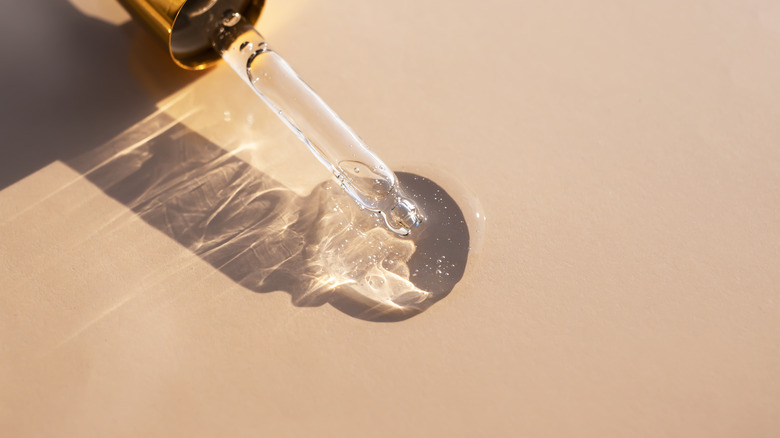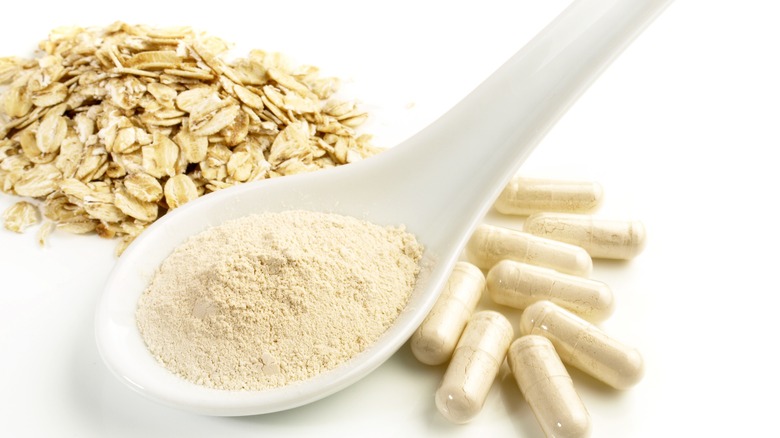Beta-Glucan Vs. Hyaluronic Acid: Which Is Better For Improving Your Skin Barrier?
There are a lot of things involved in maintaining your skin's health, but the chief of it all is making sure that your skin barrier is protected. To the uninitiated, the skin barrier is essentially the topmost layer of the skin, and it works to protect the rest from damaging external factors. It's also known to prevent transepidermal water loss, or the process of water evaporating through the skin. When damaged, your skin will be more prone to breakouts, blemishes, premature wrinkles, and more. No one wants that!
It's easy to harm your skin barrier, especially if you're using a lot of products in your regimen. However, dermatologist Dr. Naana Boakye tells Self that "environmental factors can also weaken the skin barrier, including low humidity and dramatic temperature changes." And while it can repair itself over time, there are ingredients you can apply to expedite the process, notably hyaluronic acid and beta-glucans. But is one better than the other in terms of providing protection?
What is hyaluronic acid?
If you're a skincare nerd, you're likely already familiar with hyaluronic acid, as it is found in hundreds if not thousands of products, thanks to its hydrating properties. Naturally found in the body, Mayo Clinic defines it as a "gooey substance" that plays a big role in retaining water and keeping the skin bouncy. "The collagen in our dermis forms the structure of the skin," dermatologist Dr. Tsippora Shainhouse shares with Allure. "Natural hyaluronic acid is bound to collagen on one side and links to water molecules on the other, giving skin its plumpness."
With hydration being a crucial part of overall skin health, hyaluronic acid's natural ability to provide lubrication is the key reason why it's a mainstay in the product labels of skin care products. Whether it's applied topically or injected, it works wonders in making sure that your skin is well-hydrated and that water is locked in instead of evaporating. And while there is "acid" attached to its name, professionals note that there's nothing to be wary of. Hyaluronic acid is safe for use for all skin types, including sensitive skin.
What is beta glucan?
Beta-glucan may not be universally known compared to other skincare ingredients, but it won't be surprising if it eventually ends up being a core part of moisturizers, serums, creams, and other hydrating products. Board-certified Dr. Dendy Engelman describes it as "polysaccharides (multiple sugars, starch, cellulose bonded together) found in yeast, bacteria, fungi, seaweed, and grains like oats" (via Byrdie). It's already found in the food you consume often, but it can be extracted and formulated to work as a topical product.
But what makes it intriguing is that it supposedly offers better hydrating effects compared to hyaluronic acid. "What's unique about beta-glucan that maybe hyaluronic acid does not have is that it creates this nice even film on the surface of the skin," dermatologist Dr. Michelle Henry tells Refinery29. It can apparently "go around the cell and makes its way to the epidermis," meaning it can go skin-deep and hydrates your skin from within.
On top of hydration, beta-glucan is powerful enough to support the skin's natural barrier, protect it against free radicals, facilitate collagen production, and deliver plumping effects. It also "boosts and stimulates our immune system by increasing the presence of a cell called macrophages in our skin," Dr. Lindsey Zubritsky explains to Bustle. Additionally, it can help smooth the complexion, meaning it can reduce the appearance of fine lines and wrinkles.
Is one better than the other?
Both beta-glucan and hyaluronic acid offer similar benefits, but if you're only going to prioritize one ingredient, it may be worth choosing the former. Why? As it turns out, beta-glucan is found to be more hydrating than hyaluronic acid — 20% more, in fact, according to Preserv Skincare. And unlike hyaluronic acid, which only tends to stay on the skin's surface, beta-glucan goes beyond, targeting other layers of the skin, as well.
In terms of protecting the skin barrier, beta-glucan is the clear winner again. It reportedly shields the skin from viruses, too. "Beta-glucans work by stimulating the macrophages (they work to fight off invading pathogens that can cause infections) and stimulate other immune cells to attack pathogens," dermatologist Dr. Dendy Engelman explains to Byrdie. "Think of them as ringleaders. For those who have compromised skin barriers like eczema or dermatitis, beta-glucan can help fight viruses and pathogens that pass through your skin barrier."



